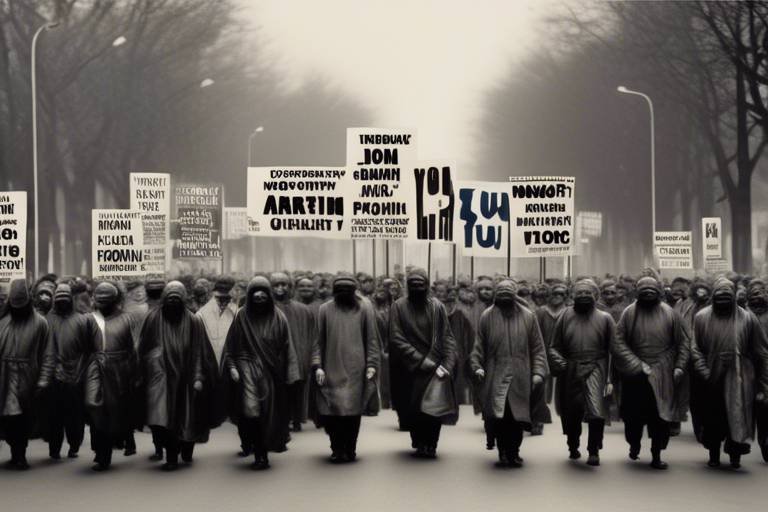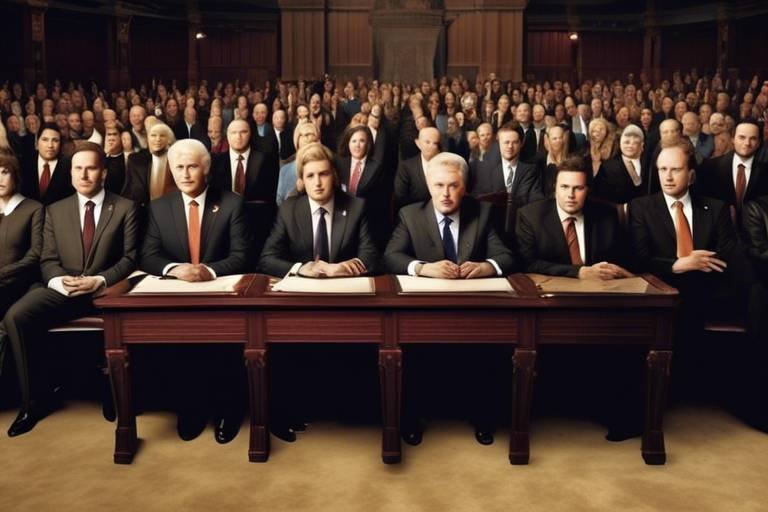Philosophy, Nationalism, and the Politics of Identity
The intricate relationship between philosophy, nationalism, and the politics of identity is a compelling narrative that shapes our contemporary world. As we navigate through the complexities of our identities, we often find ourselves questioning what it means to belong to a nation, a culture, or even a community. This exploration is not just an academic exercise; it resonates deeply within the lives of individuals and groups as they seek to define themselves in a rapidly changing landscape. The intertwining of these elements raises significant questions: How do philosophical ideas influence nationalist movements? What role does identity play in our social interactions? And ultimately, how do these factors contribute to the polarization we often witness in today’s political discourse?
At the heart of nationalism lies a rich tapestry of philosophical thought that has evolved over centuries. Thinkers such as Jean-Jacques Rousseau, John Stuart Mill, and Friedrich Nietzsche have all contributed to the discourse surrounding national identity and collective belonging. Rousseau's idea of the "general will" suggests that the interests of the community should prevail, laying a foundational stone for modern nationalistic thought. Meanwhile, Mill's concept of liberty emphasizes the importance of individual rights within the framework of national identity, creating a tension that still exists today.
Furthermore, Nietzsche's critique of traditional morality challenges the very essence of what it means to belong to a nation. His ideas compel us to question whether our national identities are constructed from genuine cultural heritage or merely a reflection of imposed narratives. As we delve into these philosophical foundations, we begin to see how they shape not only the ideologies of nationalism but also the very fabric of our identities.
In recent years, we have witnessed a significant rise in identity politics, a phenomenon that complicates our understanding of nationalism. This movement, which emphasizes the importance of specific social identities—such as race, gender, and sexual orientation—has transformed political discourse. It challenges traditional notions of nationalism by advocating for the recognition of diverse identities within the national framework.
But what does this mean for the future of nationalism? As identity politics gain prominence, we are faced with both opportunities and challenges. On one hand, it fosters inclusivity and representation; on the other, it risks fragmenting the national narrative into competing identities. This tug-of-war creates a dynamic political landscape where unity and division coexist, often leading to heated debates about the essence of national identity.
Cultural narratives and symbols play a pivotal role in shaping both individual and collective identities. They serve as the backbone of nationalist movements, providing a sense of belonging and continuity. The stories we tell about ourselves and our communities are not just for entertainment; they are powerful tools that shape our perceptions of who we are. From folklore to national anthems, these cultural elements foster a shared identity that can unite people across various backgrounds.
Language, in particular, is a crucial instrument for expressing national identity. It acts as a vessel for cultural transmission and a marker of belonging. The way we speak, the words we choose, and the dialects we use all contribute to our sense of identity. In many cases, language can create barriers, delineating who is considered part of the nation and who is not. This raises important questions about the inclusivity of national identity: Is it possible to have a cohesive national identity in a multilingual society?
Historical narratives also significantly influence national identity. The stories we choose to remember—or forget—shape our collective memory, fostering a sense of belonging among citizens. For instance, national holidays often commemorate key events that define a nation’s character. However, these narratives can also lead to exclusion, as they may overlook or marginalize the experiences of certain groups. Understanding the complexity of historical memory is essential in navigating the politics of identity.
While nationalism can foster unity, it is not without its critics. Philosophers argue that nationalism can lead to exclusion and xenophobia, raising ethical concerns about loyalty to the nation-state. The notion of “us versus them” can create an environment ripe for conflict, where the perceived threat of the 'other' undermines social cohesion. This critique challenges us to consider the implications of our national loyalties and whether they serve to uphold or undermine our shared humanity.
In our increasingly connected world, globalization presents both challenges and opportunities for nationalism. As cultures intermingle and borders blur, traditional nationalist frameworks are being redefined. This intersection raises questions about what it means to be a citizen in a globalized society. Are we losing our national identities, or are we simply evolving into something more complex?
The emergence of transnational identities is a fascinating response to globalization. Individuals now navigate multiple cultural affiliations, reflecting the realities of migration and global interconnectedness. This complexity enriches our understanding of identity but also complicates the notion of belonging. How do we reconcile our national identities with our global experiences? This question is at the forefront of contemporary discussions about identity.
Finally, the intersection of post-colonial theories with nationalism sheds light on the ongoing struggles for self-determination among marginalized communities. In many cases, national identities have been shaped by colonial histories, leading to complex relationships with the notion of the nation-state. Understanding these dynamics is crucial for fostering inclusive identities that honor diverse experiences and histories.
- What is the relationship between nationalism and identity politics? Nationalism often emphasizes a shared national identity, while identity politics focuses on individual and group identities, sometimes leading to tension between the two.
- How do cultural narratives shape national identity? Cultural narratives provide a framework for understanding collective experiences, fostering a sense of belonging and continuity within a nation.
- What are the critiques of nationalism? Critics argue that nationalism can lead to exclusion and xenophobia, raising ethical concerns about loyalty to the nation-state.

The Philosophical Foundations of Nationalism
Nationalism is not merely a political movement; it is deeply rooted in philosophical thought that shapes how individuals and communities perceive their identities. At its core, nationalism is about belonging—an emotional and intellectual connection to a shared culture, history, and language. Philosophers throughout history have contributed to the framing of nationalist ideologies, providing frameworks that justify the existence and significance of nations. Thinkers like Johann Gottfried Herder and Ernest Renan have emphasized the role of cultural identity in nationalism, arguing that a nation is more than just a political entity; it is a collective of people bound by shared experiences and values.
Herder, for instance, proposed the idea of Volksgeist, or the "spirit of the people," suggesting that each nation has a unique cultural essence that defines it. This notion underscores the belief that a nation is rooted in its language, traditions, and collective memories, which collectively contribute to a sense of identity. On the other hand, Renan argued that a nation is built on a shared past and a common will to live together, emphasizing the importance of collective memory and social bonds in fostering national identity.
The philosophical discourse surrounding nationalism often leads to debates about what constitutes a nation and who belongs to it. This brings us to the question of exclusion vs. inclusion. While nationalism can foster a sense of unity and pride among members of a nation, it can also create barriers for those who do not fit the prescribed national identity. This duality is especially pertinent in today's multicultural societies, where the definition of national identity is constantly evolving. Philosophers like Charles Taylor have critiqued traditional nationalist ideologies, arguing that they can lead to exclusionary practices that marginalize minority groups and undermine social cohesion.
Moreover, the philosophical foundations of nationalism are increasingly being challenged by the realities of globalization. In a world where boundaries are becoming more fluid, the rigid definitions of national identity are being questioned. This has led to the emergence of new forms of identity that transcend traditional nationalism, as people navigate their affiliations in a global context. Philosophers like Anthony D. Smith have explored the idea of ethno-symbolism, which posits that nations are formed through a combination of ethnic ties and historical symbols, suggesting that national identity is a dynamic construct influenced by both historical narratives and contemporary realities.
In conclusion, the philosophical foundations of nationalism are complex and multifaceted. They involve a delicate balance between the celebration of cultural uniqueness and the risk of exclusion. As we navigate through the 21st century, understanding these philosophical underpinnings becomes crucial, especially as we witness the rise of identity politics and the ongoing debates about what it means to belong to a nation. The challenge lies in fostering a sense of national identity that is inclusive and reflective of our diverse societies, allowing for a rich tapestry of identities to coexist.
- What is nationalism? Nationalism is a political ideology that emphasizes the interests and culture of a particular nation, often in opposition to foreign influence.
- How do philosophical theories influence nationalism? Philosophical theories provide frameworks for understanding national identity, belonging, and the moral implications of nationalism.
- Can nationalism be inclusive? Yes, nationalism can be inclusive, but it requires a redefinition of national identity that embraces diversity and multiculturalism.
- What role does culture play in nationalism? Culture shapes national identity through shared language, traditions, and historical narratives that bind individuals together.

Identity Politics in Modern Society
In recent years, the term identity politics has surged to the forefront of political discourse, igniting fervent debates across the globe. But what exactly does it mean? At its core, identity politics refers to the ways in which individuals and groups align themselves based on shared characteristics, such as race, gender, ethnicity, sexual orientation, and other facets of identity. This phenomenon has reshaped the landscape of social movements, providing marginalized communities with a platform to voice their struggles and aspirations. However, it also raises critical questions about the implications for political discourse and the fabric of society itself.
One of the most striking features of identity politics is its ability to mobilize communities. When people unite under a common identity, they can amplify their voices and demand recognition and rights that have historically been denied to them. For example, movements such as Black Lives Matter and the LGBTQ+ rights movement have harnessed identity politics to challenge systemic injustices and advocate for change. This has led to a profound shift in how we perceive social justice and the mechanisms through which it can be achieved.
However, the rise of identity politics is not without its challenges. Critics argue that it can lead to a form of exclusivity, where individuals are judged solely based on their identity rather than their ideas or contributions. This can create an environment where dialogue is stifled, and the potential for collaboration across different identity groups diminishes. In essence, while identity politics can empower, it can also polarize, making it essential for us to navigate this complex terrain thoughtfully.
Moreover, the intersection of identity politics with traditional nationalism adds another layer of complexity. In many cases, nationalist movements have co-opted identity politics to reinforce a sense of belonging that is often exclusionary. This brings us to a critical question: how do we balance the need for collective identity with the values of inclusivity and diversity? The answer lies in fostering a dialogue that respects individual identities while recognizing our shared humanity.
As we delve deeper into the implications of identity politics, it is crucial to consider the role of culture in shaping our identities. Cultural narratives, symbols, and practices not only define who we are but also influence how we relate to others. For instance, the celebration of cultural heritage can strengthen community ties, but it can also create barriers when those ties are used to justify exclusion. Thus, understanding the cultural dimensions of identity politics is vital for promoting a more inclusive society.
In summary, identity politics is a double-edged sword in modern society. It serves as a powerful tool for marginalized voices but also presents challenges that can lead to division. As we navigate this evolving landscape, it is imperative to engage in open conversations that bridge divides and foster understanding. Only then can we hope to harness the positive potential of identity politics while mitigating its pitfalls.
- What is identity politics? Identity politics refers to political movements that focus on the interests and perspectives of specific social groups, often based on shared characteristics such as race, gender, or sexual orientation.
- How does identity politics affect social movements? It empowers marginalized groups to advocate for their rights and recognition, leading to significant social change.
- What are the criticisms of identity politics? Critics argue that it can create division and exclusivity, focusing too much on identity rather than shared goals.
- Can identity politics coexist with nationalism? Yes, but it requires careful navigation to ensure inclusivity and avoid exclusionary practices.

The Role of Culture in Identity Formation
Culture plays a pivotal role in shaping both individual and collective identities. It acts as a lens through which we perceive the world and, importantly, how we perceive ourselves. Think about it: when you hear a song from your childhood or taste a dish that your grandmother used to make, those experiences evoke feelings and memories that are deeply tied to your identity. This is not just nostalgia; it’s a reminder of who we are and where we come from.
At the heart of cultural identity are narratives and symbols that define a group. These narratives often stem from shared history, language, traditions, and values. For instance, consider how national holidays, folklore, and even popular media contribute to a sense of belonging. They create a tapestry of experiences that bind individuals to a larger community. In many ways, culture acts as a glue, holding together the diverse threads of human experience into a coherent identity.
Moreover, cultural symbols—be it a flag, an anthem, or traditional attire—serve as powerful markers of identity. They communicate not just who we are but also what we stand for. When people rally around a national flag, they are not merely showing support for their country; they are affirming their connection to a shared story and a collective destiny. This sense of belonging can be incredibly empowering, but it can also lead to exclusion if one group’s cultural symbols are prioritized over others.
In the context of nationalism, culture becomes even more significant. Nationalist movements often draw heavily on cultural narratives to foster a sense of unity and purpose. For example, leaders may invoke historical events that resonate with the populace, using them to galvanize support for their political agendas. This can create a powerful emotional connection, but it also raises questions about whose narratives are being told and whose are being silenced.
As we navigate the complexities of modern identity, it's crucial to recognize that culture is not static. It evolves and adapts, influenced by globalization, migration, and technological advancements. Today, we see a blending of cultures that creates hybrid identities. People may identify with multiple cultures simultaneously, leading to a rich, albeit complex, sense of self. This intersectionality is vital in understanding the modern individual, as it reflects the diverse and interconnected world we live in.
In summary, culture is a fundamental component of identity formation. It shapes our beliefs, influences our behaviors, and connects us to others. As we explore the intricate relationship between culture and identity, we must remain aware of the power dynamics at play and strive to create inclusive narratives that honor the diversity of human experience.
- How does culture influence personal identity?
Culture influences personal identity by providing a framework of values, beliefs, and practices that shape how individuals view themselves and their place in the world.
- What role do symbols play in nationalism?
Symbols in nationalism serve as powerful representations of collective identity, fostering unity and a sense of belonging among members of a nation.
- Can identity be fluid?
Yes, identity can be fluid, especially in a globalized world where individuals are exposed to multiple cultures and influences, allowing them to adopt aspects from various identities.

Language and National Identity
Language is not just a means of communication; it is a powerful vessel of culture and identity. When we delve into the relationship between language and national identity, we uncover a tapestry woven with threads of history, culture, and collective memory. Each nation has its own unique linguistic characteristics that reflect its heritage and worldview. For instance, consider how the French language is intertwined with the concept of liberté, égalité, fraternité—values that are deeply embedded in French national identity. This connection illustrates how language can encapsulate the essence of a nation’s ethos.
Moreover, language serves as a boundary marker, delineating who belongs to a nation and who does not. In countries like Spain, where multiple languages coexist, such as Spanish, Catalan, and Basque, the language spoken can signify one’s regional identity and even political allegiance. This linguistic diversity often fuels debates about nationalism and autonomy, as language becomes a symbol of resistance against perceived cultural hegemony. In this sense, language is not merely a tool for communication; it is a political weapon that can unite or divide.
As we navigate through the complexities of language and national identity, we must also consider the role of language policy. Governments often implement policies that prioritize certain languages over others, impacting educational systems, media, and public life. For example, in countries like Canada, the promotion of both English and French reflects an attempt to embrace bilingualism and multiculturalism. However, in other contexts, such as in the case of minority languages facing extinction, the neglect of these languages can lead to a profound loss of cultural identity. The following table illustrates some of the implications of language policies on national identity:
| Language Policy | Implications for National Identity |
|---|---|
| Bilingualism | Fosters inclusivity and multiculturalism, enhancing national unity. |
| Language Suppression | Marginalizes minority groups, leading to cultural erosion and resentment. |
| Language Revitalization | Strengthens cultural pride and reaffirms identity among indigenous populations. |
In addition to policies, we must also consider the impact of globalization on language and national identity. As cultures intermingle, languages evolve and borrow from one another, leading to the emergence of pidgins and creoles. These new forms of language can create a sense of shared identity among diverse groups, yet they may also provoke anxiety among those who feel that their traditional language is under threat. The dynamic nature of language thus mirrors the fluidity of national identity in an increasingly interconnected world.
Ultimately, the interplay between language and national identity is a complex dance that continues to evolve. It raises critical questions about belonging, cultural preservation, and the future of national narratives. As we engage in discussions about identity, we must remember that language is not just a tool for communication; it is a living expression of who we are as individuals and as nations.
- How does language influence national identity? Language shapes our understanding of culture and belonging, acting as a marker of identity and a means of expressing national values.
- What is the impact of globalization on language? Globalization can lead to the blending of languages, creating new forms of communication but also threatening the survival of minority languages.
- Can language policies affect cultural identity? Yes, language policies can either support multiculturalism and inclusivity or marginalize certain groups, impacting their cultural identity.

Historical Narratives and Memory
Historical narratives and collective memory are the bedrock upon which national identities are built. They serve as the stories we tell ourselves about who we are and where we come from. These narratives are not merely facts; they are the emotional and cultural threads that weave together the fabric of a nation. Think about it: when we recount the tales of our ancestors, we are not just sharing history; we are affirming our identity and our place in a larger community.
At the heart of these narratives lies the concept of collective memory. This term refers to how groups remember their past, shaping their identity and influencing their future. Collective memory is not static; it evolves over time, often reflecting the current socio-political climate. For instance, in times of crisis, nations may emphasize stories of resilience and unity, while in more peaceful periods, narratives might focus on progress and achievement. This fluidity highlights how memory is not just about remembering; it’s about constructing identity.
One of the fascinating aspects of historical narratives is their ability to shape perceptions of belonging and exclusion. For example, consider how different nations commemorate significant events—like wars, independence movements, or revolutions. The way these events are portrayed can either foster a sense of unity or deepen divisions. Nations often celebrate their heroes and downplay or vilify their adversaries, which can lead to a skewed understanding of history. This selective memory plays a crucial role in how national identity is formed and maintained.
Moreover, the narratives we embrace can significantly impact contemporary politics. In many cases, political leaders harness historical narratives to rally support or justify policies. For instance, invoking a glorious past can inspire national pride and solidarity, while highlighting past injustices can mobilize marginalized groups seeking recognition and rights. This interplay of memory and politics is a double-edged sword—while it can unite, it can also polarize.
To illustrate the power of historical narratives, let’s take a look at some key events that have shaped national identities around the world:
| Event | Country | Impact on National Identity |
|---|---|---|
| American Revolution | United States | Fostered ideals of freedom and democracy |
| French Revolution | France | Established principles of liberty, equality, and fraternity |
| Independence Movement | India | Promoted unity in diversity and anti-colonial sentiment |
| Fall of the Berlin Wall | Germany | Symbolized reunification and the end of division |
In conclusion, the interplay between historical narratives and memory is a fundamental aspect of national identity. These stories shape our understanding of who we are, influence our political landscape, and ultimately define our collective future. As we navigate an increasingly complex world, it is essential to recognize the power of these narratives and the responsibility that comes with them. How we choose to remember can either bind us together or drive us apart, making the study of history not just an academic pursuit, but a vital endeavor for fostering understanding and unity in our diverse societies.
- What is collective memory? Collective memory refers to how groups remember their past, shaping their identity and influencing their future.
- How do historical narratives impact national identity? Historical narratives shape perceptions of belonging and exclusion, influencing how nations celebrate or vilify certain events and figures.
- Can historical narratives change over time? Yes, historical narratives are not static; they evolve based on the current socio-political climate and collective experiences.
- Why is understanding historical narratives important? Understanding historical narratives is crucial for fostering unity and understanding in diverse societies and recognizing the complexities of identity politics.

Philosophical Critiques of Nationalism
Nationalism, while often celebrated for fostering a sense of belonging and community, has also faced significant philosophical critiques. At its core, nationalism can be seen as a double-edged sword; it has the potential to unite people under a common identity but can also lead to division and conflict. Critics argue that nationalism often promotes an exclusionary mindset, where individuals are judged based on their national affiliation rather than their shared humanity. This perspective raises important questions: Is it ethical to prioritize national loyalty over global solidarity? Can nationalism coexist with universal human rights?
One prominent critic, philosopher Ernest Gellner, posited that nationalism is not merely a political ideology but a necessary response to the demands of modernity. He argued that the rise of industrial societies necessitated a common culture and language for effective communication and cohesion. However, this necessity can lead to the marginalization of minority groups, fostering feelings of alienation among those who do not fit the dominant national narrative. Gellner's critique highlights the tension between the need for a cohesive national identity and the ethical implications of excluding those who do not conform.
Moreover, philosophers like David Miller have scrutinized the ethical dimensions of nationalism, questioning the legitimacy of prioritizing the interests of one's nation over others. Miller argues that while it is natural for individuals to feel a sense of loyalty to their nation, this loyalty should not come at the expense of justice and equality for all. This critique emphasizes the potential for nationalism to breed xenophobia and intolerance, particularly in times of crisis when nations may resort to scapegoating outsiders for their problems.
Another critical perspective comes from Hannah Arendt, who warned against the dangers of nationalism leading to totalitarianism. Arendt believed that nationalism could strip individuals of their unique identities, reducing them to mere representatives of their nation. This reductionist view can lead to a dangerous homogenization of thought and culture, where dissent is stifled in favor of a singular national narrative. In this sense, nationalism can undermine the very freedoms it claims to protect, creating an environment where conformity is valued over diversity.
Ultimately, the critiques of nationalism challenge us to rethink our understanding of identity and belonging. As we navigate an increasingly interconnected world, it is crucial to balance the desire for national unity with a commitment to inclusivity and global responsibility. Philosophers urge us to consider the implications of our national loyalties and to strive for a more ethical approach to identity that honors both our individual uniqueness and our shared humanity.
- What are the main critiques of nationalism? Critics argue that nationalism can lead to exclusion, xenophobia, and ethical dilemmas regarding loyalty and justice.
- How does nationalism affect minority groups? Nationalism can marginalize minority groups by prioritizing the dominant national narrative, leading to feelings of alienation.
- Can nationalism coexist with global solidarity? While nationalism fosters a sense of belonging, it can also challenge global solidarity by promoting an exclusionary mindset.
- What role do philosophers play in critiquing nationalism? Philosophers provide frameworks to analyze the ethical implications of nationalism and encourage a balance between national loyalty and global responsibility.

The Intersection of Globalization and Nationalism
In today's world, the relationship between globalization and nationalism is a complex dance, one that often leaves us questioning our identities and allegiances. As nations become increasingly interconnected through trade, technology, and cultural exchange, the very fabric of national identity is being rewoven. But how does this interplay manifest in our daily lives? It’s like watching a two-sided coin flip; on one side, you have the unifying force of globalization, and on the other, the powerful pull of nationalism. Each influences the other in ways that can be both surprising and explosive.
Globalization has brought about a world where ideas, people, and goods travel faster than ever before. This rapid exchange fosters a sense of global citizenship, where individuals begin to identify more with global issues rather than just national ones. However, this broadening of perspective can lead to a backlash. Nationalist movements often emerge as a response to the perceived threats posed by globalization, arguing that local cultures and identities are at risk of being overshadowed by a homogenized global culture. It's as if globalization is a wave that sometimes washes over national identities, leaving behind a sense of erosion and loss.
One of the most significant challenges posed by this intersection is the redefinition of national boundaries. In the past, borders were primarily physical, demarcating where one nation ended and another began. Today, however, these boundaries are increasingly blurred. Consider the rise of transnational corporations and the global workforce; they challenge traditional notions of belonging and identity. People move across borders for work, education, and family, creating a tapestry of identities that does not always fit neatly into the boxes of nationalism.
Moreover, the cultural exchange that accompanies globalization often enriches national identities, adding layers of complexity. For instance, food, music, and art from various cultures intermingle, creating a vibrant mosaic that reflects both local and global influences. Yet, this fusion can also provoke nationalist sentiments, as some may feel that their traditional values and practices are being diluted. It raises the question: how do we celebrate cultural diversity without compromising our national identities?
Interestingly, globalization can also serve as a platform for nationalist movements to gain traction. Social media, for example, allows nationalist groups to connect with like-minded individuals across the globe, amplifying their messages and mobilizing support. This phenomenon illustrates the duality of globalization: it can both unite and divide, fostering a sense of global community while simultaneously igniting fierce national pride.
As we navigate this intricate landscape, it's essential to recognize that the intersection of globalization and nationalism is not a zero-sum game. Instead, it presents an opportunity for dialogue and understanding. Countries can learn from one another while still honoring their unique identities. This balance is crucial for fostering a world where diversity is celebrated rather than feared. Just like a well-crafted dish, the best outcomes arise when different ingredients come together harmoniously, creating something truly delightful.
- What is globalization? Globalization refers to the process of increased interconnectedness among countries, driven by trade, communication, and cultural exchange.
- How does nationalism react to globalization? Nationalism often emerges as a response to globalization, emphasizing local culture and identity in the face of perceived threats from a homogenized global culture.
- Can globalization and nationalism coexist? Yes, they can coexist. While globalization promotes interconnectivity, nationalism can provide a sense of belonging and identity, leading to a complex interplay between the two.
- What role does culture play in this intersection? Culture serves as both a unifying and dividing force. It can enrich national identities through globalization while also provoking nationalist sentiments when perceived as being threatened.

Transnational Identities
The concept of has emerged as a fascinating response to the complexities of our increasingly interconnected world. As people migrate, travel, and communicate across borders more than ever before, traditional notions of identity—rooted in singular national affiliations—are being challenged. Imagine a tapestry woven from threads of various cultures, languages, and experiences; this is what transnational identities represent. They embody a blend of influences that transcend geographical boundaries, allowing individuals to identify with multiple nations and cultures simultaneously.
In a globalized society, individuals often find themselves navigating multiple identities. For instance, a person might be born in India, raised in Canada, and work in the United States. This rich background creates a unique identity that incorporates elements from each of these cultures. Such experiences lead to a more nuanced understanding of belonging that defies the rigid definitions of nationalism. Instead of feeling confined to one identity, many people embrace a fluid sense of self that reflects their diverse experiences. This fluidity can be both liberating and challenging, as individuals grapple with the expectations of their various cultural affiliations.
One of the most significant aspects of transnational identities is the way they foster multiculturalism. This can be seen in urban centers around the world, where communities are a mosaic of different cultures, languages, and traditions. These vibrant environments encourage individuals to celebrate their heritage while also engaging with others. However, this multicultural interaction is not without its challenges. Conflicts can arise when individuals feel pressure to conform to dominant cultural norms or when misunderstandings occur between different cultural groups. Thus, while transnational identities promote inclusivity, they also highlight the need for dialogue and understanding.
Moreover, transnational identities can be shaped by various factors, including technology, media, and global economic trends. The rise of social media platforms has facilitated connections across borders, allowing individuals to share their experiences and cultural practices with a global audience. This digital landscape enables the formation of virtual communities that transcend national boundaries, further complicating the notion of identity. As people engage with diverse perspectives online, they often find themselves redefining their own identities in relation to these global narratives.
To illustrate the impact of transnational identities, consider the following table that outlines key characteristics:
| Characteristic | Description |
|---|---|
| Multiplicity | Individuals identify with multiple national and cultural affiliations. |
| Fluidity | Identity is not fixed; it can change based on experiences and contexts. |
| Global Connectivity | Technology and media facilitate connections across borders. |
| Cultural Exchange | Engagement with diverse cultures enriches personal identity. |
| Challenges of Belonging | Individuals may face conflicts between different cultural expectations. |
In conclusion, transnational identities are reshaping the way we understand ourselves and our place in the world. They challenge the traditional frameworks of nationalism and invite us to embrace a more inclusive view of identity that reflects the realities of our global society. As we continue to navigate this complex landscape, it is crucial to foster conversations that promote understanding and acceptance among diverse cultural groups. After all, in a world that is becoming increasingly interconnected, our identities may be the one thing that can unite us despite our differences.
- What are transnational identities? Transnational identities refer to the identities individuals form by integrating elements from multiple cultures and nations, often as a result of globalization and migration.
- How do transnational identities affect nationalism? Transnational identities challenge traditional nationalist frameworks by promoting a fluid sense of belonging that transcends singular national affiliations.
- What role does technology play in shaping transnational identities? Technology, especially social media, facilitates connections across borders, allowing individuals to engage with diverse cultures and redefine their identities.
- Are there challenges associated with transnational identities? Yes, individuals may face conflicts between different cultural expectations and pressures to conform to dominant norms within their communities.

Nationalism in a Post-Colonial Context
In the wake of colonialism, nationalism has taken on a unique and complex role in shaping the identities of formerly colonized nations. This phenomenon is not merely an echo of past struggles but a vibrant, evolving dialogue that seeks to redefine what it means to belong to a nation. Post-colonial nationalism often emerges as a response to the historical injustices and cultural erasures inflicted by colonial powers. It serves as a powerful tool for reclaiming identity, sovereignty, and agency in a world that frequently marginalizes these communities.
One of the most striking aspects of nationalism in a post-colonial context is its ability to foster a sense of collective identity among diverse groups. This is particularly important in nations where colonial rule has left a legacy of fragmentation and division. For instance, consider the multitude of ethnicities and languages present in countries like India or Nigeria. Nationalism, in these cases, can act as a unifying force, helping to bridge divides and create a shared sense of purpose. However, this unification can also lead to tensions, as the quest for a singular national identity may inadvertently exclude minority voices.
Moreover, post-colonial nationalism often grapples with the remnants of colonial ideologies that continue to influence societal structures. This struggle can manifest in various ways, such as debates over language, education, and cultural representation. For example, the push to promote indigenous languages and traditions can clash with the lingering dominance of colonial languages and practices. This dynamic highlights the ongoing negotiation of identity, where the past and present collide, creating a landscape rich with both challenges and opportunities.
In many cases, post-colonial nationalism is intertwined with global movements for social justice and self-determination. As marginalized communities assert their rights, they often draw upon the narratives of their colonial past to frame their struggles in contemporary terms. This interplay can be seen in movements advocating for indigenous rights, land reclamation, and cultural preservation. These initiatives not only seek to address historical grievances but also aim to redefine national narratives in ways that are inclusive and representative of all citizens.
To illustrate the complexities of nationalism in a post-colonial context, let’s take a look at a table that summarizes key characteristics:
| Characteristic | Description |
|---|---|
| Reclamation of Identity | Efforts to restore cultural practices and languages suppressed during colonial rule. |
| Collective Memory | Utilizing shared experiences of colonialism to foster unity among diverse groups. |
| Global Solidarity | Connecting local struggles with international movements for justice and equality. |
| Exclusion vs. Inclusion | The tension between forging a national identity and recognizing minority rights. |
As we navigate the complexities of nationalism in a post-colonial context, it is crucial to recognize that this is not a straightforward journey. It is filled with contradictions, where the desire for national pride can sometimes clash with the need for inclusivity and representation. The challenge lies in finding a balance that honors the past while embracing a future that is equitable for all. In this ongoing dialogue, the voices of those historically marginalized must be amplified, ensuring that the narrative of nationalism evolves to reflect the rich tapestry of identities that comprise a nation.
- What is post-colonial nationalism? Post-colonial nationalism refers to the movement for self-determination and identity reclamation in nations that were previously colonized.
- How does post-colonial nationalism differ from traditional nationalism? While traditional nationalism often emphasizes a singular national identity, post-colonial nationalism seeks to include diverse voices and experiences shaped by colonial histories.
- What role does language play in post-colonial nationalism? Language is crucial in expressing national identity and cultural heritage, often becoming a focal point in efforts to reclaim indigenous identities.
- Can nationalism be a force for good in post-colonial societies? Yes, when it fosters unity and inclusivity, nationalism can help build a cohesive national identity that honors all citizens.
Frequently Asked Questions
- What is the relationship between philosophy and nationalism?
Philosophy provides the foundational ideas that shape nationalist ideologies. Thinkers like Rousseau and Hegel have influenced how we view national identity and collective belonging. Their ideas often serve as a lens through which we can understand the motivations behind nationalist movements.
- How has identity politics evolved in modern society?
Identity politics has gained prominence as individuals and groups seek recognition and representation based on their unique identities. This shift has transformed social movements and political discourse, challenging traditional nationalist frameworks and prompting debates about inclusion and exclusion.
- What role does culture play in shaping identity?
Cultural narratives and symbols are crucial in forming both individual and collective identities. They foster a sense of belonging and continuity within a nation, often becoming rallying points for nationalist movements, highlighting the deep connection between culture and identity.
- Why is language considered important for national identity?
Language acts as a powerful tool for expressing national identity. It not only communicates cultural values but also helps establish political boundaries. The preservation of a language often signifies the preservation of a culture and its unique identity.
- How do historical narratives influence national identity?
Collective memory and historical narratives shape how people view their nation's past, fostering a sense of unity and shared experience. These narratives often serve to legitimize current identities and political claims, making them essential in the context of nationalism.
- What are the philosophical critiques of nationalism?
Critics argue that nationalism can lead to exclusion and xenophobia, raising ethical concerns about loyalty to one's nation over universal human rights. These critiques challenge the notion that national identity should take precedence over global citizenship.
- How does globalization affect nationalism?
Globalization challenges traditional nationalist frameworks by creating interconnectedness that transcends national borders. This has led to the emergence of new identities and a redefinition of what it means to belong to a nation in a globalized world.
- What are transnational identities?
Transnational identities arise as individuals navigate multiple cultural and national affiliations, particularly in multicultural contexts. These identities reflect the complexities of belonging in an increasingly globalized society, where traditional notions of nationality are continuously evolving.
- How does post-colonialism intersect with nationalism?
Post-colonial theories examine how colonial histories impact contemporary nationalism and identity politics. They highlight the struggles for self-determination among marginalized communities, showing how these groups redefine their identities in the context of their historical experiences.



















